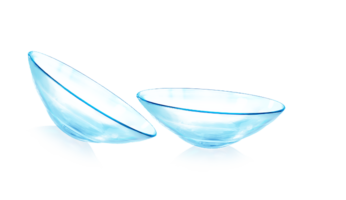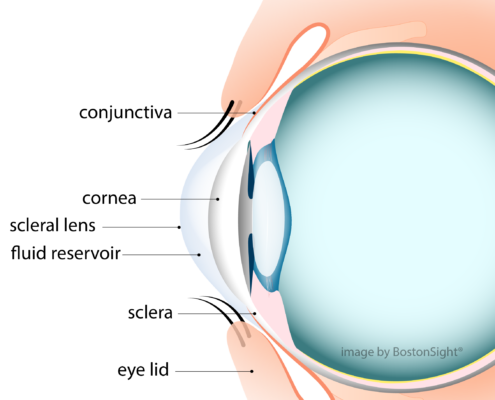BostonSight, 464 Hillside Avenue, Suite 205, Needham, MA 02494
Phone: 888-SCLERAL (888-725-3725)

Design and development by RainCastle Communications.
BostonSight SCLERAL is a data-driven scleral lens designed by BostonSight, a nonprofit eye healthcare organization and pioneer in scleral lens design technology. BostonSight has 30 years of experience managing patients with the most complex ocular surface diseases. BostonSight experience and research are directly funneled into innovations in BostonSight SCLERAL lens designs, keeping us on the leading edge of treatment and care.
BostonSight SCLERAL lenses can help patients with a range of eye disorders. They are custom-designed to fit your eye and provide maximum comfort and vision for you.

A scleral lens rests on the white of your eye (the sclera) and vaults over your cornea. The cornea is the most sensitive part of the human body. If it’s already irritated, placing a piece of plastic directly on it will hurt. With scleral lenses, because the lens is designed to not touch the cornea, there should be no pressure on your cornea.
You may have struggled with other contact lenses—but you will be surprised how comfortable this lens feels. A scleral lens creates a new surface over your damaged cornea. The space between the cornea and the lens is filled with preservative-free saline, creating a fluid reservoir. This will bathe the cornea all day to promote comfort, healing, and relief.
Soft contact lenses are about 14mm in diameter. A BostonSight SCLERAL lens ranges in size from 16mm to 19mm. This is a good thing! The larger size means:
Conjunctiva: The thin membrane lining the inside of your upper and lower eyelids and covering the outer portion of the sclera. It doesn’t cover the cornea.

Cornea: The front center portion of the eye. The cornea bends light as it enters the eyes so the light is focused on the retina.
Fluid reservoir: The space between the scleral lens and the cornea, which is filled with preservative-free saline to bathe the cornea and provide comfort and long-term ocular health.
Sclera: The white outer wall of the eye. It is less sensitive than the cornea.
9 out of 10 patients surveyed would recommend Boston Sight SCLERAL to others.
9 out of 10 patients surveyed intend to continue using BostonSight SCLERAL.
(Source: BostonSight SCLERAL Patient-Gathered Health Data 2017-2021)
How does a scleral lens feel?
If they are fit properly, you shouldn’t feel them at all. The comfort and improved vision you’ll gain will help you get back to doing all the things you enjoy!
Does the brand of scleral lens really matter?
Although each scleral lens design on the market has its own design features, all scleral lenses strive to:
It is most important to find a practitioner that can fit scleral lenses properly. BostonSight SCLERAL lenses are specially designed to simplify fitting for practitioners.
Can I get a prescription in my scleral lens?
Yes! Like a soft contact lens, scleral lenses can be fit with your prescription, even for astigmatism.
What makes BostonSight SCLERAL different?
Our lens is designed based on years of patient data. With this data, we determined common characteristics in 80 percent of patient eyes. We built these characteristics into our lens so that it is likely to fit well out of the box. Our lens also includes additional add-on features to customize the lens to your exact needs.
How difficult is it to insert and care for scleral lenses?
Like anything in life, practice makes perfect! At first, it might take a few tries to get your lenses in. But with training by the optometrist or clinical staff, inserting and removing your scleral lenses will become second nature. Your practitioner will instruct you on how to best care for your lenses, but we also have a handy Healthy Lens Habits Guide to help with basic lens care.
Am I a candidate for scleral lenses?
If you have a misshapen cornea (keratoconus), dry eye or dry eye disease, complications following LASIK surgery, or other vision problems that cannot be corrected using glasses or soft contact lenses, you may be a good candidate. Talk with your optometrist about your options. Be sure to mention BostonSight SCLERAL.
Can kids wear scleral lenses?
Yes. Children have a smaller ocular surface and will require a smaller diameter lens. BostonSight SCLERAL is a great choice based on its design and range of diameters, from 16 to 19mm.
Where can I get BostonSight SCLERAL?
We currently work with more than 300 optometrists and ophthalmologists in the U.S. and Canada. To find a provider near you, use the Find a Practitioner function.
For customers in India, please visit https://scleral.lvpei.org/